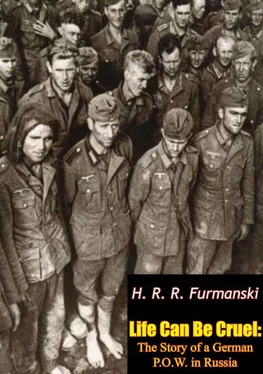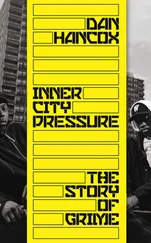H. Furmanski - Life Can Be Cruel - The Story of a German P.O.W. in Russia
Здесь есть возможность читать онлайн «H. Furmanski - Life Can Be Cruel - The Story of a German P.O.W. in Russia» весь текст электронной книги совершенно бесплатно (целиком полную версию без сокращений). В некоторых случаях можно слушать аудио, скачать через торрент в формате fb2 и присутствует краткое содержание. Год выпуска: 2016, Издательство: Pickle Partners Publishing, Жанр: Биографии и Мемуары, military_history, на английском языке. Описание произведения, (предисловие) а так же отзывы посетителей доступны на портале библиотеки ЛибКат.
- Название:Life Can Be Cruel: The Story of a German P.O.W. in Russia
- Автор:
- Издательство:Pickle Partners Publishing
- Жанр:
- Год:2016
- ISBN:нет данных
- Рейтинг книги:5 / 5. Голосов: 1
-
Избранное:Добавить в избранное
- Отзывы:
-
Ваша оценка:
- 100
- 1
- 2
- 3
- 4
- 5
Life Can Be Cruel: The Story of a German P.O.W. in Russia: краткое содержание, описание и аннотация
Предлагаем к чтению аннотацию, описание, краткое содержание или предисловие (зависит от того, что написал сам автор книги «Life Can Be Cruel: The Story of a German P.O.W. in Russia»). Если вы не нашли необходимую информацию о книге — напишите в комментариях, мы постараемся отыскать её.
An astonishing first-hand account.
Life Can Be Cruel: The Story of a German P.O.W. in Russia — читать онлайн бесплатно полную книгу (весь текст) целиком
Ниже представлен текст книги, разбитый по страницам. Система сохранения места последней прочитанной страницы, позволяет с удобством читать онлайн бесплатно книгу «Life Can Be Cruel: The Story of a German P.O.W. in Russia», без необходимости каждый раз заново искать на чём Вы остановились. Поставьте закладку, и сможете в любой момент перейти на страницу, на которой закончили чтение.
Интервал:
Закладка:
After this battle we advanced for perhaps one hundred miles without making contact with the enemy. It did not seem to occur to our leaders that the Russians were leading us into a trap. They let us penetrate deep into Russian territory, since the next Russian line was behind the river Don. We built our trench on the west side, facing the Russian soldiers on the east. Here too there were daily exchanges of bullets across the river.
The Russian Army leaders knew the wintertime to be their best ally, whereas the German leaders seemed to have learned nothing from the previous winter. The river Don, running from north to south as far as Stalingrad, was the natural defense line for the Russians. It was a severe test for our army, a nerve-racking encounter which may have been the turning point in World War II. My unit had to reinforce the efforts of the Sixth Army in and around Stalingrad, which had been the scene of violent action since November and would, presumably, soon be encircled. It was our job to keep open the north-west side for reinforcements and to bring out the sick and wounded. We moved as fast as was possible in the bitter cold and deep snow. In the first days of December we came to Kalatch, the last town before Stalingrad and virtually a suburb of that city, where we had to fight for every inch of our advance. We kept fighting for the next fourteen days, not knowing that it was we ourselves who were encircled.
This circle in Stalingrad was a hell on earth, each house a battlefield. It was here that my luck ran out, though I didn’t know at the time which would be better—to be dead or taken prisoner of war. On Sunday morning, December 20, I was captured by some Russian soldiers, though the Red Cross band around my left arm was clearly visible. To be a prisoner of war, especially in the most violent battle of that war, seemed to be ill fortune almost beyond enduring. I felt that I would be better off dead. As soon as the soldiers had taken our private property—rings, watches, warm clothes, and boots—they brought us back to the commander, who was a commissar of the NKVD. He was quartered in an old shack; it was here that my mistreatment began. As soon as he saw me he took up his whip and beat my face till it bled. I was, of course, an intruder on his soil, but I was also a prisoner of war without weapons, besides being an ambulance attendant entitled to protection under the rules of the Geneva Convention. Such cruelty seemed unbelievable in the twentieth century, but it was only a foretaste of what was to come. I wished with all my heart that I could die.
We were kept in this shack until all fifteen prisoners had made their statements about name, rank, and unit. In the meantime one prisoner asked to go to the toilet, one guard accompanying him. They were scarcely out of sight when we heard a shot, and the guard came back alone. In my heart I envied the dead man, for there was no way of knowing what would happen to us.
We were asked questions about the strength of our unit, but since we were cut off from our unit we were unable to answer—and even if we had known we would not have told them. After this interrogation we were forced to march about ten miles, and from that point on we had to shovel snow to clear the road so the cars could pass and bring food and reinforcements to Stalingrad. It was bitterly cold, and we were made to work from dawn till late at night. The guards brought our food along, which consisted of two pieces of table sugar, one-half salt herring, and one piece of dry black bread, the daily ration for each man. There was nothing to drink, so we ate snow.
At night, when the moon was shining, the guards came and drove us back in our shelter, a two-room house, unoccupied now in wartime, which was located on the outskirts of a small village. The former inhabitants of this house had taken the windows, furniture, and everything movable. It was cold and drafty, the wind blowing snow in the open windows as we sat on the floor close to one another to keep warm, shivering and freezing and waiting for the next morning when we would go again out in the desert of snow. The guards came very early in the morning, when it was still dark, and we had to report the number of our crew before we received our breakfast, which consisted of one cup of hot water and one slice of dry, black rye bread (suchari). After breakfast we were counted again before being sent out in the bitter cold. In this manner fourteen days passed. Each one of us came down with some form of sickness, several beginning to swell in the face and legs, others suffering the first symptoms of pneumonia. Backache was a common ailment. I told the guard that we needed a doctor, but he didn’t understand what I was talking about.
Some days later I became sick and couldn’t go to work anymore. I was burning with fever. When it became apparent to the guard that we were little more than walking corpses, he promised to call a doctor. He let us stay in our shelter till the doctor came and examined us. The doctor, seeing at first glance that there was nothing he could do, granted permission to bring all fifteen men into a hospital. We were all sick and burning with fever, but we had to wait till a truck came. We had no appetite for food, but we craved water.
The truck came the next day. Two guards helped us to board the truck, giving us two loaves of bread and some sugar for all of us; then we started to drive across country. We didn’t know in what direction we were traveling, but we heard the artillery fire from the front, or thought we did. Though sometimes it seemed that our minds were already suffering from delusion.
Two days later the truck stopped at a train station, and we were transferred to the freight wagon of a train. After two days of riding on the train we came to the town of Volsk, located south of Gorki, which was our destination. As soon as we appeared marching in the streets, the people of this town threw stones and everything they could find at us, swearing hysterically and spitting at us, calling us fascists and imperialists. I understood the source of this hatred, for we were intruders on Russian soil, but we were now prisoners of war, without weapons, sick and in need of understanding, and it seemed odd to me that they did not realize that few of us would have gone voluntarily to war, especially against Russia.
Soon we arrived at the hospital, a big stone house, formerly a school, but now in wartime, housing the wounded and sick prisoners. As we reached the entrance we found the air so full of stench and decay that we could scarcely breathe. Brutish sounds came from within, and I knew that inside was a human being at his last breath. Lord God, bless us and keep us, I thought, little realizing that I was on the threshold of my most horrible experience in life.
We entered the so-called office, where we were registered and compelled to take off all our clothing and put it in bags. These would be given back to us when we were healthy again. We were provided with a pair of drawers, a shirt, a blanket, and slippers, and, thus thinly clothed, sent to the bathhouse, some fifty yards away in the backyard, to take a bath. On the way to the bathhouse two of the fifteen collapsed and died, their hearts unable to endure this sudden change of temperature. We were given a bowl with hardly one gallon of water in it for our bath; then we marched back to the main building to find a bed.
What I had seen in the first hour was enough to convince me that we would be fortunate if any of us survived this ordeal. Pitiful specimens of humanity, walking human bodies like skeletons, their heads bald, their eyes sunken, walking with hands on the wall to support themselves, were crying for help, praying for redemption. The room in which I was placed was the isolation room, filled with those patients who were deathly ill. Here two bedsteads were put together, with boards across them on which five men could lie. I had to lie between four men who were sick with dysentery and typhus. We had only two pillows and one blanket for the five of us. Besides this bed there were five others. A bucket in one corner served as a chamberpot, but few of these men were well enough to reach the chamberpot in time, relieving themselves on the floor or wherever they happened to be. The stench was terrible, not only in this room but in all parts of the hospital, for the only lavatory was in the basement. We had no towels or anything with which to clean our hands. In the morning, when the first “nurse” came on duty, she asked, “How many are dead?” After we gave her the number, she asked, “What, no more?”
Читать дальшеИнтервал:
Закладка:
Похожие книги на «Life Can Be Cruel: The Story of a German P.O.W. in Russia»
Представляем Вашему вниманию похожие книги на «Life Can Be Cruel: The Story of a German P.O.W. in Russia» списком для выбора. Мы отобрали схожую по названию и смыслу литературу в надежде предоставить читателям больше вариантов отыскать новые, интересные, ещё непрочитанные произведения.
Обсуждение, отзывы о книге «Life Can Be Cruel: The Story of a German P.O.W. in Russia» и просто собственные мнения читателей. Оставьте ваши комментарии, напишите, что Вы думаете о произведении, его смысле или главных героях. Укажите что конкретно понравилось, а что нет, и почему Вы так считаете.












